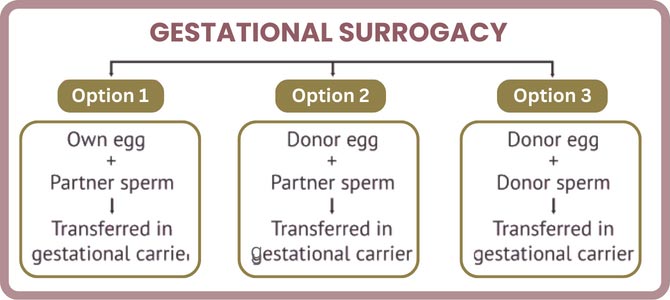Surrogacy is a process by which a woman agrees to carry a baby for another person or couple. Surrogacy is legal in Canada, and there are a number of different ways to go about it. Here is what you need to know about surrogacy in Canada.
Also, this blog will tell you about:
- What is surrogacy?
- What are the laws surrounding surrogacy in Canada?
- What are the benefits of surrogacy in Canada?
- What are the risks of surrogacy in Canada?
- How much does surrogacy in Canada cost?
What is surrogacy?
Surrogacy is a process in which a woman agrees to become pregnant and carry a baby to term for another couple or individual. She may be the baby’s genetic mother (the woman who provides the egg), or she may be carrying a baby for someone else.

What are the laws surrounding surrogacy in Canada?
There are a few laws surrounding surrogacy in Canada. The first is that surrogacy is only allowed if it is altruistic, meaning that the surrogate mother is not being paid for her services. The second law is that the surrogate mother must be a Canadian citizen or a permanent resident of Canada. And finally, the intended parents must be Canadian citizens or permanent residents of Canada. There are a few other regulations in place, but these are the most important ones.
There are certain things that you need to know about surrogacy laws in Canada. They are as follows:
- In Canada, surrogacy is permitted and governed by federal law.
Surrogacy is both authorized and governed by the federal Assisted Human Reproduction Act (AHRA) and Canadian law. However, some provincial laws, such as those that specify who is recognized by law as a child’s parent, are also very important.
- Only reimbursement for expenses can be given to surrogates instead of paying for their services.
All surrogacy in Canada is required to be “altruistic,” according to the ARHA. As a result, the surrogate is unable to profit from her role. In Canada, surrogates are only permitted to be reimbursed or paid for a specific set of expenses; they are not permitted to be paid a salary.
Surrogates are only permitted to be reimbursed or paid for a specific set of expenses; they are not permitted to be paid a salary. In contrast to other states, like California, where a surrogate may charge a fee, this one does not.
All of the surrogate’s allowable expenses must be supported by paperwork, like receipts, and may also need formal approval from a physician that they are essential. This covers the surrogate’s travel to medical visits, legal costs, counseling services, any goods or services that a doctor or midwife recommends in writing, as well as maternity wear.
- Before starting a pregnancy, a surrogacy agreement is required.
In accordance with Canadian law, surrogacy cannot occur without an existing surrogacy agreement. The surrogate shall also, prior to the execution of the Agreement, obtain independent legal advice in accordance with Canadian law. Usually, after the intended parents’ attorney has drafted the contract, the surrogate hires her own attorney (paid for by the intended parents) to review it with her.
What are the benefits of surrogacy in Canada?
There are many benefits to surrogacy in Canada. For starters, Canada has some of the most progressive laws in the world when it comes to surrogacy. This means that Canadians who want to become parents through surrogacy can do so in a safe and legally recognized manner.
In addition, Canada boasts excellent medical care and high-quality facilities, which ensure that surrogacy pregnancies progress smoothly and result in healthy babies. Finally, Canada is an affordable destination for surrogacy, making it an attractive option for those looking to start a family through surrogacy.

What are the risks of surrogacy in Canada?
There are a number of risks associated with surrogacy in Canada. First and foremost, there is a risk that the surrogate mother will not give up the baby after birth. This has happened in the past and can result in a great deal of stress and legal wrangling.
There is also the risk that the surrogate mother will suffer complications during the pregnancy or delivery. This could have serious consequences for both the mother and the baby.
Finally, there is always the risk that the surrogate mother will change her mind about the arrangement and keep the baby. This could lead to a lengthy and costly legal battle.
How much does surrogacy in Canada cost?
Surrogacy cost in Canada can be expensive, ranging from $35,000 to $60,000. This price includes agency fees, legal fees, and other associated costs. Surrogacy remains a popular option for those who are unable to conceive naturally, despite the fact that the cost may be out of reach for some couples.
How do I go about surrogacy in Canada?
Although becoming a surrogate mother in Canada can be a complicated process, it can also go smoothly with the assistance of a reputable fertility clinic and attorney. If you’re thinking about surrogacy in Canada, you should consider the following steps:
- Talk to a lawyer.
It is important to consult with a lawyer who specializes in surrogacy law to ensure that you are aware of all of your options and the legal process involved.
- Choose a fertility clinic.
Not all fertility clinics offer surrogacy services, so you will need to do your research and find a clinic that is right for you.
- Interview potential surrogates.
Once you have chosen a fertility clinic, you will need to interview potential surrogates. Make sure to ask them questions about their medical history, family history, and their reasons for wanting to be a surrogate.
- Finalize your arrangements.
Once you have chosen a surrogate, the fertility clinic will help you finalize the arrangements and prepare for the transfer of the embryo.
What are the risks and rewards of surrogacy in Canada?
There are many risks and rewards associated with surrogacy in Canada. One of the biggest rewards is that surrogates in Canada are generally well compensated. They can receive between $20,000 and $35,000 for their services. This is a significant amount of money, especially when you consider that the average Canadian earns just $50,000 a year.
However, there are also risks associated with surrogacy in Canada. One of the biggest is that the process is often unregulated. This can lead to a number of problems, including poor screening of potential surrogates and the use of unqualified professionals. As a result, there is a risk that children will be born with genetic defects or that pregnant women will be put at risk.
If you are thinking about surrogacy in Canada, it is important to understand the process and the different ways to go about it. There are a number of things to consider, including cost, legal requirements, and who will be the legal parents of the child. Make sure you consult with a lawyer and other professionals to get the best advice for your situation.
We are a leading surrogacy agency in Canada. Our agency has been working with egg donors, surrogates, and intended parents in Canada for many years now, and will help you in this journey to Parenthood. We have helped thousands of parents achieve their dreams of building a FAMILY. We’ll guide you through the entire journey while providing personal support.



No Comments